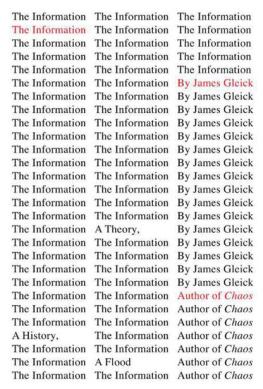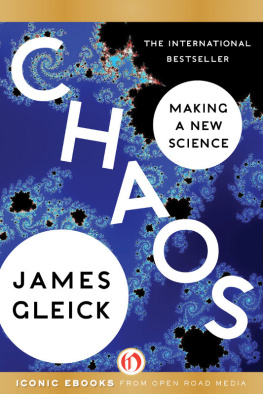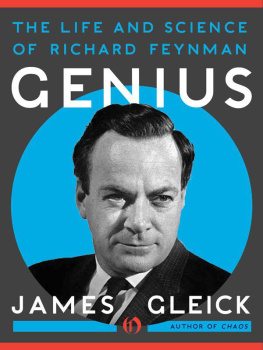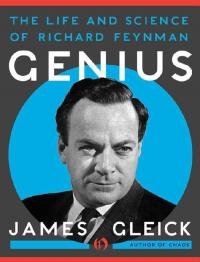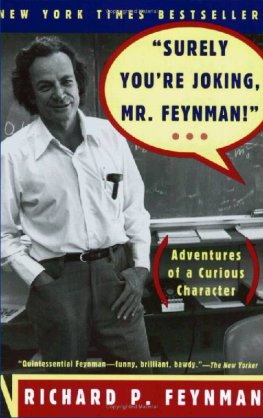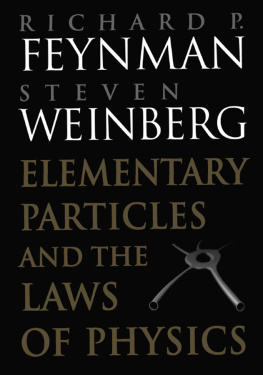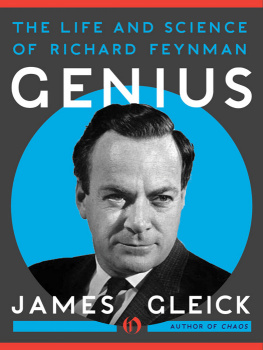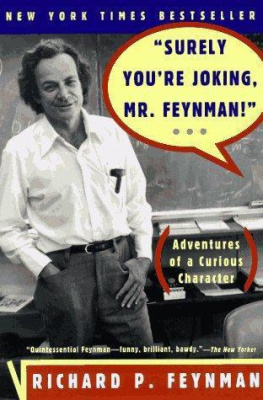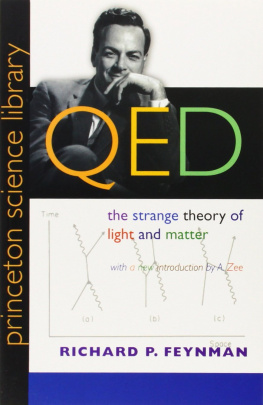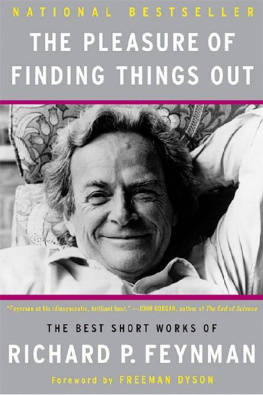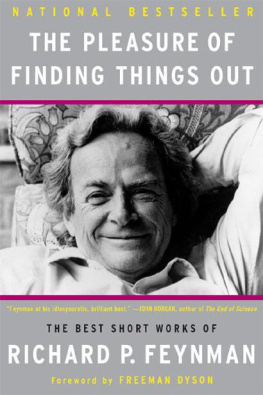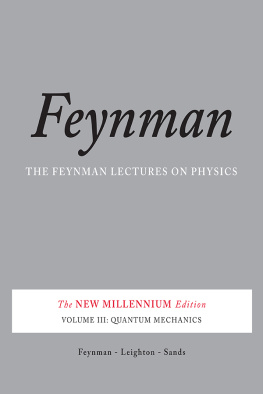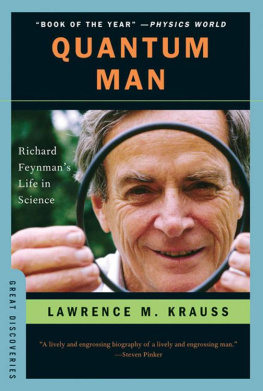Genius
The Life and Science of Richard Feynman
James Gleick
For my mother and father,
Beth and Donen
I was born not knowing
and have only had a little time to change that here and there.
Richard Feynman
CONTENTS
Nothing is certain. This hopeful message went to an Albuquerque sanatorium from the secret world at Los Alamos. We lead a charmed life.
Afterward demons afflicted the bomb makers. J. Robert Oppenheimer made speeches about his shadowed soul, and other physicists began to feel his uneasiness at having handed humanity the power of self-destruction. Richard Feynman, younger and not so responsible, suffered a more private grief. He felt he possessed knowledge that set him alone and apart. It gnawed at him that ordinary people were living their ordinary lives oblivious to the nuclear doom that science had prepared for them. Why build roads and bridges meant to last a century? If only they knew what he knew, they surely would not bother. The war was over, a new era of science was beginning, and he was not at ease. For a while he could hardly workby day a boyish and excitable professor at Cornell University, by night wild in love, veering from freshman mixers (where women sidled away from this rubber-legged dancer claiming to be a scientist who had made the atomic bomb) to bars and brothels. Meanwhile new colleagues, young physicists and mathematicians of his own age, were seeing him for the first time and forming their quick impressions. Half genius and half buffoon, Freeman Dyson, himself a rising prodigy, wrote his parents back in England. Feynman struck him as uproariously Americanunbuttoned and burning with physical energy. It took him a while to realize how obsessively his new friend was tunneling into the very bedrock of modern science.
In the spring of 1948, still in the shadow of the bomb they had made, twenty-seven physicists assembled at a resort hotel in the Pocono Mountains of northern Pennsylvania to confront a crisis in their understanding of the atom. With Oppenheimers help (he was now more than ever their spiritual leader) they had scraped together the thousand-odd dollars needed to cover their rooms and train fare, along with a small outlay for liquor. In the annals of science it was the last time but one that such men would meet in such circumstances, without ceremony or publicity. They were indulging a fantasy, that their work could remain a small, personal, academic enterprise, invisible to most of the public, as it had been a decade before, when a modest building in Copenhagen served as the hub of their science. They were not yet conscious of how effectively they had persuaded the public and the military to make physics a mission of high technology and expense. This meeting was closed to all but the few invited participants, the elite of physics. No transcript was kept. Next year most of these men would meet once more, hauling their two blackboards and eighty-two cocktail and brandy glasses in Oppenheimers station wagon, but by then the modern era of physics had begun in earnest, science conducted on a scale the world had not seen, and never again would its chiefs come together privately, just to work.
The bomb had shown the aptness of physics. The scientists had found enough sinew behind their penciled abstractions to change history. Yet in the cooler days after the wars end, they realized how fragile their theory was. They thought that quantum mechanics gave a crude, perhaps temporary, but at least workable way to make calculations about light and matter. When pressed, however, the theory gave wrong results. And not merely wrongthey were senseless. Who could love a theory that worked so neatly at first approximation and then, when a scientist tried to make the results more exact, broke down so grotesquely? The Europeans who had invented quantum physics had tried everything they could imagine to shore up the theory, without success.
How were these men to know anything? The mass of the electron? Up for grabs: a quick glance gave a reasonable number, a hard look gave infinitynonsense. The very idea of mass was unsettled: mass was not exactly stuff, but not exactly energy, either. Feynman toyed with an extreme view. On the last page of his tiny olive-green dime-store address book, mostly for phone numbers of women (annotated dancer beauty or call when her nose is not red), he scrawled a near haiku.
Principles
You cant say A is made of B
or vice versa.
All mass is interaction.
Even when quantum physics worked, in the sense of predicting natures behavior, it left scientists with an uncomfortable blank space where their picture of reality was supposed to be. Some of them, though never Feynman, put their faith in Werner Heisenbergs wistful dictum, The equation knows best. They had little choice. These scientists did not even know how to visualize the atom they had just split so successfully. They had created and then discarded one sort of picture, a picture of tiny particles orbiting a central nucleus as planets orbit the sun. Now they had nothing to replace it. They could write numbers and symbols on their pads, but their mental picture of the substance beneath the symbols had been reduced to a fuzzy unknown.
As the Pocono meeting began, Oppenheimer had reached the peak of his public glory, having risen as hero of the atomic bomb project and not yet having fallen as the antihero of the 1950s security trials. He was the meetings nominal chairman, but more accomplished physicists were scattered about the room: Niels Bohr, the father of the quantum theory, on hand from his institute in Denmark; Enrico Fermi, creator of the nuclear chain reaction, from his laboratory in Chicago; Paul A. M. Dirac, the British theorist whose famous equation for the electron had helped set the stage for the present crisis. It went without saying that they were Nobel laureates; apart from Oppenheimer almost everyone in the room either had won or would win this honor. A few Europeans were absent, as was Albert Einstein, settling into his statesmanlike retirement, but with these exceptions the Pocono conclave represented the whole priesthood of modern physics.
Night fell and Feynman spoke. Chairs shifted. The priesthood had trouble following this brash young man. They had spent most of the day listening to an extraordinary virtuoso presentation by Feynmans exact contemporary, Julian Schwinger of Harvard University. This had been difficult to follow (when published, Schwingers work would violate the Physical Review s guidelines limiting the sprawl of equations across the width of the page) but convincing nonetheless. Feynman was offering fewer and less meticulous equations. These men knew him from Los Alamos, for better and for worse. Oppenheimer himself had privately noted that Feynman was the most brilliant young physicist at the atomic bomb project. Why he had acquired such a reputation none of them could say precisely. A few knew of his contribution to the key equation for the efficiency of a nuclear explosion (still classified forty years later, although the spy Klaus Fuchs had transmitted it promptly to his incredulous masters in the Soviet Union) or his theory of predetonation, measuring the probability that a lump of uranium might explode too soon. If they could not describe his actual scientific work, nevertheless they had absorbed an intense image of an original mind. They remembered him organizing the worlds first large-scale computing system, a hybrid of new electro-mechanical business calculators and teams of women with color-coded cards; or delivering a hypnotic lecture on, of all things, elementary arithmetic; or frenetically twisting a control knob in a game whose object was to crash together a pair of electric trains; or sitting defiantly upright, for once motionless, in an army weapons carrier lighted by the purple-white glare of the centurys paradigmatic explosion.
Next page

